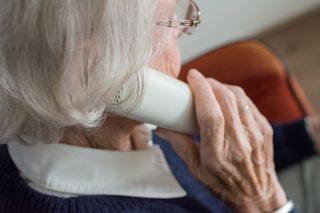Loneliness
10 Tips to Stop Elder Fraud Before It Happens
Why trustworthy older adults are victims, and how we can help.
Posted January 26, 2023 Reviewed by Vanessa Lancaster
Key points
- Older adults are vulnerable to financial abuse by predators. Loneliness and cognitive difficulties make some especially susceptible to fraud.
- To detect and report fraud before it happens do not give out personal information over the phone and, when in doubt, go to the source.
- Older adults can also investigate charities asking for donations and report fraudsters to authorities.

Bessie, the energetic 89-year-old matriarch of a large and loving family, recently received a phone call that shook her to the core.
A male voice cried, “Grandma, I need your help!”
A confused Bessie asked, “Kenny, is this you?” – guessing that the voice belonged to the oldest of her five 20-something grandsons.
“Uh, yes, this is Kenny,” responded the caller. He told Bessie he was in trouble and needed her to send him $5,000 immediately.
Panicked and frightened, Bessie handed the phone to her husband, Al.
Al told “Kenny” that he could send him $3,000 right away, but then started to sense that something was fishy and hung up the phone. Al’s quick thinking saved the couple thousands of dollars and the emotional anguish that plagues countless older adults who are victims of financial exploitation each year.
The “grandparent scam” is one of the oldest tricks in the book. A predator reaches out by phone, email, or text and tells an unsuspecting older adult that their beloved grandchild is in big trouble – a lost wallet while traveling abroad or in the ER after a car accident. This is a particularly cruel type of fraud because it preys on a grandparent’s love and concern.
But it’s just one of a dizzying list of ploys that victimizes 10 to 15 percent of older adults each year, robbing them of an estimated $1 billion in 2021, according to the Federal Trade Commission. Unscrupulous telemarketers – selling magazines or life insurance – get older adults’ banking information over the phone and siphon their savings. Fake charities request donations by mail, tugging at the heartstrings by showing images of malnourished children or injured animals.
During the pandemic, scam artists posing as government officials offered to “rush” their CARES (Coronavirus Aid, Relief, and Economic Security) Act stimulus checks for an upfront fee.
Romantic scams also prey on lonely widows and widowers. A 76-year-old widow from Rhode Island refinanced her home, emptied her bank account, and sent more than $660,000 to the handsome gentleman who friended her on a social media site. Although her virtual friend claimed to be “General Mathew Weyer,” stationed with the U.S. Army in Afghanistan, there was no General Weyer; his image and words were concocted by a multinational internet fraud ring.
Young people reading this might ask, “how could older people possibly fall for these tricks?” Decades of research in gerontology shows that older people tend to be more trusting than younger people and see the good in others – wonderful traits that unscrupulous fraudsters can exploit.
With age also comes cognitive declines that can leave older people less capable of detecting fraud. Older adults also can be socially isolated as their spouses and friends die. Those alone or lonely may be especially likely to pick up the phone and confide personal details to the soothing (yet insincere) voice on the other end.
Even those who are smart, tech-savvy, and educated can fall for scams, as rapidly evolving technologies generate new and sophisticated schemes. U.S. and state governments are increasingly cracking down on fraud and imprisoning the perpetrators, but it’s hard to nab all of them. With the U.S. population aging more rapidly than ever, fraudsters know that millions of older adults are ready prey.
What can older adults do to protect themselves? And what can concerned children and grandchildren do to bolster this protection?
- Don’t give out personal information over the phone. Credit card numbers, bank account numbers, and Social Security numbers should be kept private.
- If you don’t recognize it, ignore it. Ignore incoming texts and calls from unfamiliar numbers. If it’s important and legitimate, they’ll leave a message.
- Trust your instincts. If something feels “off,” it probably is.
- When in doubt, go to the source. If a caller says they’re your grandchild, hang up and phone the grandchild directly. If they say they’re calling from a local charity you’d like to support, hang up and call the charity directly.
- It’s not the government. No state or federal agency would ask for personal information over the phone.
- Don’t rush. Any caller pushing you to act quickly – with a donation or purchase – may mean trouble. Hang up if they’re rushing you to act.
- Check out the charities. Using databases like Charity Navigator can help to suss out whether an organization is legitimate or a sham.
- Call in the authorities. Ask for help, whether the local police department or hotlines like AARP’s Fraud Watch Network Helpline. Report it to the FTC online or at 877-382-4357, or notify your state's attorney general and consumer protection office.
- Speak out. Victims often are embarrassed to share that they’ve been a target of fraud. Know that it can happen to anyone. Sharing the news will help to inform and protect others.
- Don’t be alone. Older adults who are most isolated are the most vulnerable. Check in on older loved ones and neighbors so they have a sounding board and won’t be so ready to talk to strangers.
The financial exploitation of older adults can happen to anyone, even a “superhero” like Marvel Comics creator Stan Lee. Being informed and aware is the first step to stopping fraudsters in their tracks.


